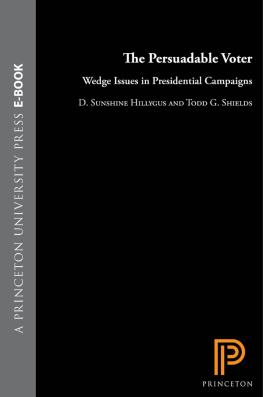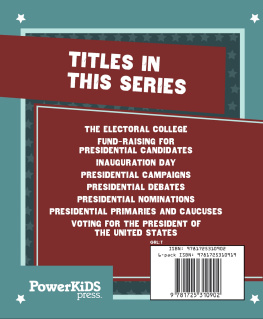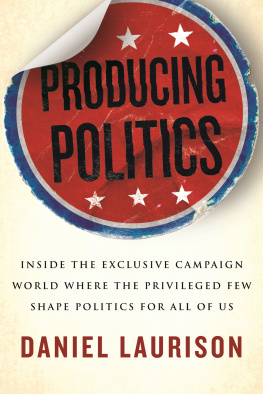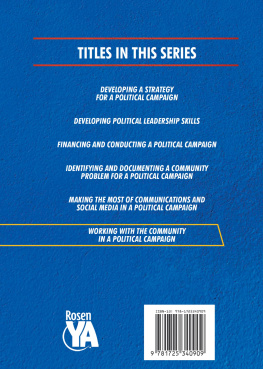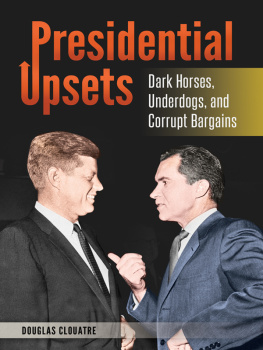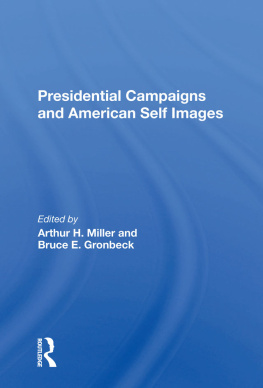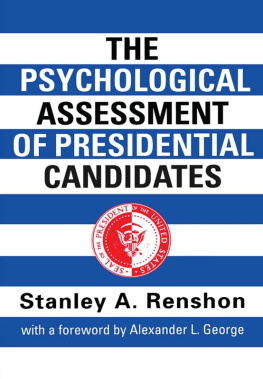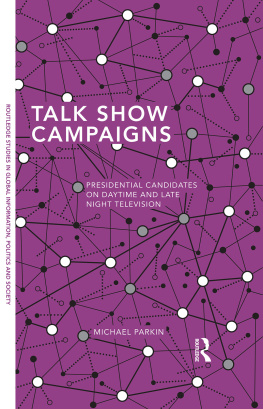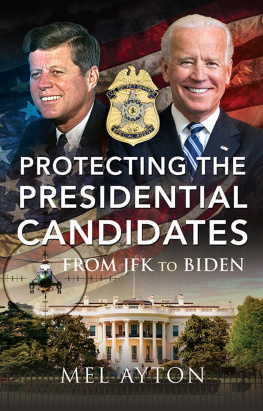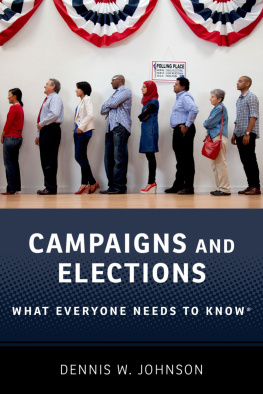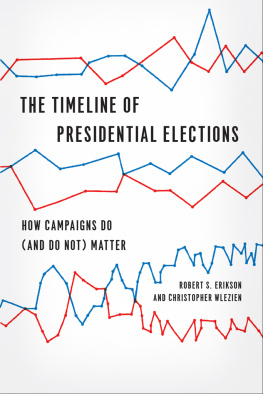
THE PERSUADABLE VOTER
THE PERSUADABLE VOTER
WEDGE ISSUES IN PRESIDENTIAL CAMPAIGNS
D. Sunshine Hillygus and Todd G. Shields
PRINCETON UNIVERSITY PRESS PRINCETON AND OXFORD
Copyright 2008 by Princeton University Press
Published by Princeton University Press, 41 William Street, Princeton, New Jersey 08540
In the United Kingdom: Princeton University Press, 6 Oxford Street, Woodstock, Oxfordshire OX20 1TW
All Rights Reserved
Hillygus, D. Sunshine.
The persuadable voter : wedge issues in presidential campaigns / D. Sunshine Hillygus and Todd G. Shields.
Includes bibliographical references and index.
ISBN: 978-0-691-13341-6 (hardcover : alk. paper)
1. PresidentsUnited StatesElection. 2. VotingUnited States.
3. United StatesPolitics and government. I. Shields, Todd G., 1968
II. Title.
JK528.H55 2008
324.70973dc22 2007037758
British Library Cataloging-in-Publication Data is available
This book has been composed in Palatino
Printed on acid-free paper.
press.princeton.edu
Printed in the United States of America
10 9 8 7 6 5 4 3 2 1
In memory of Diane D. Blair, 19382000
Contents _____________________________________________________________
One
Wedge Issues in Presidential Campaigns |
Two
The Reciprocal Campaign |
Three
Measuring the Persuadable Partisan |
Four
Capturing Campaign Persuasion |
Five
The Republican Southern Strategy: A Case Study of the Reciprocal Campaign |
Six
Candidate Strategy in the 2004 Campaign |
Seven
Conclusions: Consequences for Democratic Governance |
Appendix 1
Question Wording and Coding |
Appendix 2
Content Analysis Coding |
Appendix 3
Statistical Results |
List of Illustrations _____________________________________________________________
List of Tables _____________________________________________________________
Acknowledgments _____________________________________________________________
THIS STARTED OUT as a completely different book. We had planned on writing a book about voting behavior in the South as a tribute to our friend and mentor, Diane Blair. But intellectual ideas from a variety of projects bled together so that, ultimately, we have written a book about presidential campaigns, with just a single chapter focused on the South (although that chapter is one of our favorites). This topic is perhaps just as fitting for a book dedicated to Diane Blairshe was the rare academic who contributed both to political science and to the real world of campaign politics. Diane seamlessly blended her passion for research and teaching with her passion for politicsand that passion was infectious. As a freshman at the University of Arkansas in 1992, Sunshine got caught up in the excitement of the presidential campaign, and with Diane as a role model, changed her major to political science. To Todd, Diane served as a mentor when he was a young assistant professor at the University of Arkansas, demonstrating to him the direct link between scholarly research and real politics with her work during the 1996 presidential campaign.
The Diane D. Blair Center for Southern Politics and Society was created to honor Dianes legacy, and this book would not have been possible without the centers generous funding of two unique surveys. Funding from the Institute for Quantitative Social Science and a fellowship at the Shorenstein Center for the Press, Politics, and Public Policy gave Sunshine a full year of research leave to devote to writing. And because of the generous support of the Center for American Political Studies at Harvard University, we were able to hold a book conference around the first draft of the manuscript, providing critical feedback before it was too late to make changes.
We were able to include a great variety of data sources and analyses in this work only because of the willingness of so many scholars to share their data. Daron Shaw provided us with data on state-by-state candidate advertising and visit numbers from the 2000 and 2004 campaigns. Lee Sigelman and Emmet Buell shared their content analysis of New York Times coverage of the 19522004 presidential campaigns. Joel Rivlin with the Wisconsin Advertising Project gave us the issue content of the television advertising in the 2004 presidential campaign. We are especially grateful to Doug Rivers, Simon Jackman, and Norman Nie for their willingness to share the massive 2000 Knowledge Networks Election Study, which first gave Sunshine a chance to study campaigns as a graduate student at Stanford University. We also owe a special thanks to David Magleby, Kelly Patterson, and Quin Monson of the Center for the Study of Education and Democracy at Brigham Young University for providing access to the 2004 Campaign Communications Study. Quin Monson, in particular, provided critical help and advice for our analysis of the 2004 presidential direct mail.
As the topic of this book evolved, we greatly benefited from the valuable feedback and intellectual support of some of the smartest people in the discipline. We are especially grateful to those who were willing to read the entire manuscript draft: Adam Berinsky, Daron Shaw, Richard Johnston, Bob Shapiro, Paul Sniderman, Matt Baum, Mike Alvarez, Markus Prior, Eric Schickler, Sidney Verba, Mo Fiorina, Paul Peterson, Dennis Thompson, Sam Popkin, Norman Nie, Dave Peterson, Steven Kelts and Justin Grimmer. A very special thanks (its own sentence worth!) to Jennifer Lawless for going through the manuscript draft line by line just days before it was due. A number of other colleagues provided critical advice and suggestions at various stages in the project: Pippa Norris, Jane Junn, Gary King, Don Kelley, Shannon Davis, Jon Krosnick, and Tasha Philpot.
Along the way, we have received helpful suggestions and stimulating questions in presenting the project to different audiencespolitical science conferences as well as seminars at Vanderbilt University, Columbia University, University of Chicago, Harvard University, University of Minnesota, Stanford University, Brigham Young University, the Massachusetts Institute of Technology, and the Boston chapter of the Institute of Electrical and Electronics Engineers. For especially thought-provoking and helpful comments, we would like to thank Gabe Lenz, Joanne Miller, Jeremy Pope, John Sides, Dan Carpenter, Andrea Campbell, Chap Lawson, Noah Kaplan, Phil Klinker, Bob Erikson, and Kirby Goidel. For their hard work, we would like to thank the terrific group of Harvard research assistants: Raul Campillo, Tiffany Washburn, Karen Harmel, David Daniels, Kevin Papay, and Matt Smith.
And, for helpful conversationsoccasionally about the book, but more often about more interesting topicsSunshine is grateful to Barry Burden, William Howell, Steven Kelts, Shawn Treier, Jennifer Jerit, Maggie Penn, John Patty, Jason Barabas, Cara Wong, and Jake Bowers. Todd also expresses his sincere appreciation to Jim Blair for his invaluable support and advice and for the positive and significant contributions he has made to Todds life and career.
We would also like to thank Chuck Myers, senior editor at Princeton University Press, for his enthusiastic endorsement of this project. He has helped to make the publication process the very easiest part of this project.
Last, but not least, we would like to express our gratitude to our families. If not for the unwavering encouragement, infinite patience, and numerous sacrifices of Joel Hillygus, this bookand Sunshines academic careerwould not have been possible. Karen ShieldsTodds wife for the past sixteen years and best friend for the past eighteen yearsas well as his children, Savannah and Dane, have also been exceptionally supportive throughout this project.
Next page
